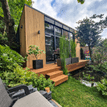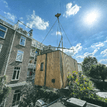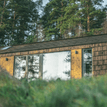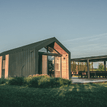What is Modular Construction? Explaining the Innovative Building Technique
In the ever-evolving world of construction and design, there is one trend that not only stands out but also radically changes the way we think about building and designing: modular construction. But what does “modular construction” really mean? And why is it gaining popularity so quickly in the construction industry? Let’s dive into this fascinating approach to construction together, explore its unique benefits, and understand why many believe it could be the key to the future of sustainable and efficient construction.
Life is not measured by the space we occupy but by the spaces that occupy us.
The Core Concept of Modular Construction Highlighted
The concept of modular construction is much more than just a buzzword or a passing trend. It represents a true shift in the construction industry. Unlike traditional construction methods, where each element is constructed separately and on-site, modular construction breaks this process down into standardized units known as modules. These modules are carefully and efficiently built in a factory setting, where quality control and precision are central. Once completed in the factory, these modules are transported to the construction site and installed.



Modular Construction: The Future of Flexible Living
The concept of modular construction has firmly established itself as a revolutionary approach to home building. But what does it really mean to build modularly, and why is it gaining so much ground in the modern construction world?
At its core, modular construction is about creating individual building modules in a controlled factory environment. These modules, each representing a specific part of a house, are then transported to the construction site and assembled into a fully functioning home. This process radically differs from traditional construction methods, where every aspect of a house is built on-site.
The Incontestable Benefits of Modular Construction
The advantages of this approach are numerous. Firstly, modular construction offers unparalleled speed. Because the modules are produced in a factory, they are not subject to the whims of weather or other unpredictable external factors. This means that construction projects can often be completed much faster than through traditional methods.
Furthermore, modular construction is synonymous with flexibility. Do you want to add an extra bedroom or office space in a few years? With a modular home, this process is simpler and less intrusive. The ability to grow and adapt to changing life circumstances makes modular construction an attractive option for many.
Above all, modular construction symbolizes a shift in how we think about living.
Our needs and desires evolve, and our homes should too. Instead of being stuck with a rigid structure, modular construction offers the freedom to create a living space that truly resonates with who we are and how we want to live.
In essence, modular construction is not just a construction technique; it’s a philosophy. A philosophy that understands that home is more than just four walls and a roof—it’s a place that adapts, evolves, and grows with us.


The Versatility of Modular Construction
In today’s dynamic world, flexibility and adaptability have become essential characteristics not only in our daily lives but also in the way we live. Modular construction, with its unique blend of innovation and adaptability, is at the heart of this evolving housing culture.
Imagine living in a home that can grow and change as your family expands or having the option to add an extra space in your backyard, or deciding to set up a home office. This is the promise of modular construction. It’s not just a building technique; it’s a lifestyle choice that caters to the needs of the modern resident.
From Compact to Spacious
The beauty of modular construction lies in its scalability. Are you just starting your housing journey and looking for a compact, affordable living solution? A modular Tiny House, like those from Tiny House Hub, could be the perfect starting point. These compact homes are designed with efficiency in mind, making the most of every square meter without compromising on comfort.
But what if your family grows or your needs change? No problem. Thanks to the modular nature of this construction technique, you can easily add additional modules, allowing your home to evolve from a cozy starter home to a more spacious family residence. And the best part is that these expansions can often be realized in a fraction of the time compared to traditional construction methods.
Adapting to Changing Lifestyles
The versatility of modular construction extends beyond just size. It also empowers homeowners to customize their living space to changing lifestyles. Think of an additional office space for remote work, a guest house for visiting family members, or even a separate studio for an emerging artist in the family.
Furthermore, with the growing emphasis on sustainability and environmental consciousness, modular construction also provides solutions that are both environmentally friendly and energy-efficient. From sustainably sourced materials to advanced insulation techniques, modular homes are often at the forefront of green building.


Why Choose Modular Construction?
- Flexibility: Modular construction offers unparalleled flexibility. Want to expand later? No problem. Modules can be easily added or removed, allowing your home or building to evolve as your needs change.
- Weather-Independent: Rain, snow, or heatwave, the construction process continues. Because modules are produced in a factory, they are not dependent on weather conditions, resulting in faster and more efficient construction times.
- Sustainability: Modular construction is not only fast but also environmentally friendly. From minimizing construction waste to the reuse of materials, modular construction methods are designed with the environment in mind.
- Cost Savings: While the initial costs may be comparable to traditional construction methods, the speed and efficiency of modular construction offer significant long-term savings.
Modular construction is a building technique in which a structure is assembled from pre-fabricated modules. These modules are manufactured in a controlled factory environment and then transported to the construction site for assembly.
Unlike traditional construction, where each component is built on-site, modular construction involves pre-fabricated units that are assembled on location. This can lead to faster construction times and less waste.
A Tiny House is a compact dwelling, often smaller than 50 square meters, designed for a simpler, less consumptive lifestyle. They can be both mobile and stationary and are often constructed with sustainable materials and technologies.
Modular construction and Tiny Houses go hand in hand. The modular approach allows individual units or modules of a Tiny House to be manufactured in a factory and then assembled on-site, ensuring efficiency and precision.
Yes, modular Tiny Houses are often more sustainable than traditionally built homes. The controlled factory environment reduces material waste, and these houses are often designed with energy efficiency and sustainability in mind.
Absolutely! One of the advantages of modular construction is flexibility. You can add or remove modules in the future depending on your needs.
Building codes vary by region, country, and municipality. It’s essential to consult local building codes and regulations before starting the construction of a modular Tiny House.







